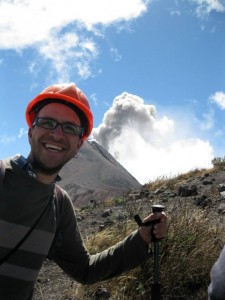A couple of weeks ago we outlined the ways in which we will be participating in the EGU General Assembly taking place in Vienna next week. We’re currently asking a few of the GfGD team who are attending to give us an outline of the sessions that caught their eye and to tell us more about their roles at the event.
 Joel Gill ( KCL PhD Student / GfGD Director)
Joel Gill ( KCL PhD Student / GfGD Director)
“EGU is always a highlight of my year, both as a PhD researcher examining natural hazard interactions and as Director of GfGD. It gives me an opportunity to hear from researchers around the world on a range of fascinating topics (many relevant to both aspects of my work) and build the relationships important to see both flourish.
Most of my time will be in sessions relating to the Natural Hazards Division, where I intend to listen to talks/view posters in sessions ranging from Active Tectonics and the Earthquake Cycle, Quantifying Volcanic Hazards, and Hydro-Meteorological Hazards – Changing Pattern of Risk and Effective Risk Mitigation Strategies. The challenge when studying multiple hazards (and their interactions) is that almost any session within the Natural Hazards Division could be relevant!
I will also be trying to find time to visit a broader range of sessions from the many that EGU offer. I have been impressed by the range of interdisciplinary topics this year – many related to the theme of sustainable development. Some key sessions for me will be Groundwater Resources in a Changing Environment, Resilience and vulnerability assessments in natural hazards and risk analysis, Planetary boundaries, societal interactions, and sustainability transitions within the Earth system, and Water and food security: integrating perspectives from geophysics and social sciences.
As well as listening to talks, I’ll be playing an active part in chairing sessions and giving presentations. On Monday and Tuesday I will be helping to convene two sessions. On Monday the topic is ‘Natural Hazards Education, Communications and Science-Policy-Practice Interface‘ and on Tuesday ‘Geoethics – Ethical Challenges In Communication, Geoeducation And Management of Natural Hazards.’ On Friday I will be talking about the value of soft skills development (cross cultural communication, diplomacy, knowledge exchange) for international development projects within the session on Geoscience Education for Sustainable Development and Widening Participation. I will also be sharing PhD research on anthropic triggering of hazards and catalysing of hazard interactions within the session on Global and continental scale risk assessment for natural hazards: methods and practice.
In addition to the many sessions of interest and convening/presenting responsibilities, the EGU is an important opportunity to meet geoscience students from across the UK and beyond, academics, and others from government, industry, NGOs and professional bodies. Normally I have a series of meetings throughout the week, including touching base with GfGD leaders and University Group Ambassadors attending the event, some of those who have advised us since we first started, and others who would like to get involved in our work.
Finally, let me take take this opportunity to remind you of our splinter meeting – an informal ‘drop-in’ where you can meet the GfGD team and find out more about our work. This will take place on Thursday 1st May 10:30-12:00 (come and go as you like) in Room R10. It would be great to have the opportunity to meet you and hear about your interest in applying geology to international development.”
Joel will be tweeting throughout the event (@GillJoel and @Geo_Dev) and posting updates on Facebook. The conference hashtag is #EGU2014.
